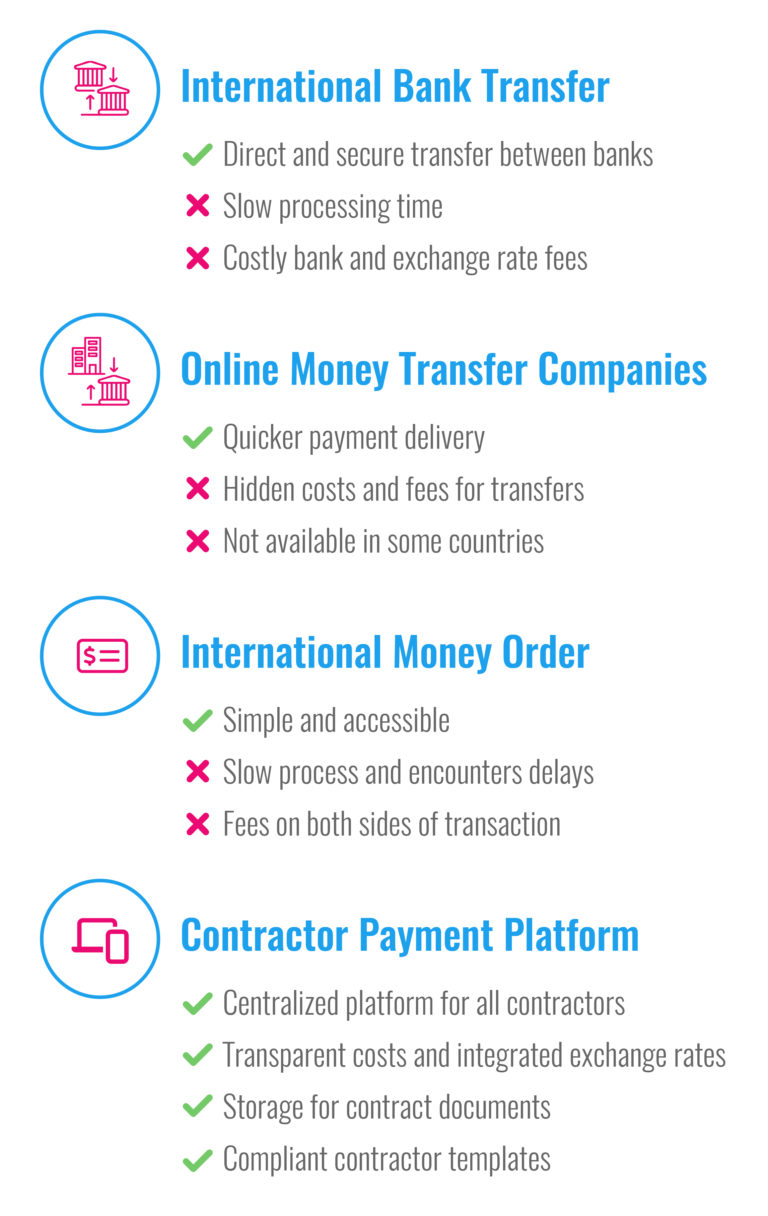The United Kingdom has a highly skilled, English-speaking workforce that is increasingly taking on self-employment. The number of contractors in the U.K. grew 35% in the past two decades, from 3.2 million in 2000 to 4.3 million in 2022.
As foreign businesses expand into this flourishing market to engage contractors, they encounter an important question: How do you securely and compliantly pay flexible talent in the U.K.?
While there are many secure ways to pay independent contractors in the U.K., companies must consider other factors before engaging talent, such as IR35 legislation, taxation, and establishing compliant contractor agreements.
This guide outlines everything you need to know about hiring independent contractors in the U.K. and the best ways to pay them.
What Classifies an Independent Contractor in the U.K.?
Independent contractors in the U.K. take full responsibility for their business operations and manage their work without supervision or receiving employee benefits. For example, they bid on their own work, submit invoices for completed work, and pay their own insurance and taxes.
By contrast, employees in the U.K. work under an employment contract and are protected by U.K. employment law. Employees receive benefits, such as sick leave and maternity leave, and are protected against unfair dismissal.
In addition to contractors and employees, the U.K. has a third laborer classification called workers. Workers, or zero-hour workers, are similar to employees but can exercise certain freedoms that employees cannot, such as the right to refuse work offers from their employer.
Employers interested in engaging contractors in the U.K. must understand the differences between these laborer classifications to avoid back pay and other contractor misclassification penalties.
Steps to Take Before Hiring an Independent Contractor in the U.K.
Before hiring an independent contractor in the U.K., an employer must clarify their IR35 liability, prepare compliant contractor agreements, and establish a payment structure and timeline.
Understand IR35 Legislation and Misclassification Risks
Inland Revenue 35 (IR35) legislation aims to prevent tax avoidance by contractors acting in the same capacity as an employee in the U.K. If a work contract falls within IR35, the contractor is bound by the same tax and national insurance contribution laws as an employee.
Employers should answer several questions to determine whether or not their contract agreement falls within IR35 legislation, such as:
- Are you classified as a small business private sector?
- Is your contractor engaged with an umbrella company?
- Does your contractor control when and how they work?
U.K. officials regularly introduce IR35 reforms, so employers must follow these changes closely to avoid misclassification penalties, such as tax and insurance back pay. To simplify this process and ensure compliance, many foreign employers rely on a contractor management solution instead.
Write an Independent Contractor Agreement
Independent contractor agreements in the U.K. play two critical roles: They establish expectations between the employer and contractor and help prove compliance with IR35 legislation if Her Majesty’s Revenue and Customs (HMRC) in the U.K. audits your business.
An independent contractor agreement in the U.K. may include several items, such as:
- Project scope and tasks
- Project start and end dates
- Compensation amount, structure, and timeline
- Who is liable for task completion and resource provision
- Non-disclosure agreements, if applicable
- Termination guidelines and related penalties
Establish a Payment Structure and Timeline
You and your independent contractor in the U.K. should agree on a payment structure and timeline that suits both parties. You should then outline those terms clearly in your work agreement. Employers can choose from various payment structures, such as:
- Pre-payment. You pay for the entirety of services before completion.
- Payment upon completion. You pay upon service completion. This method is the safest way to protect your investment and may include a minimum compensation.
- Partial completion. You pay a deposit at the start and the remainder upon service completion. This method protects your investment and the contractor’s investment.
Employers may also agree to pay independent contractors in the U.K. by the hour or project. This decision depends on the type of work and expected timeline as outlined in your agreement.
Once you have clarified your IR35 liability, set up contractor agreements, and established a payment structure and timeline, you need to choose a method for paying your contractors.
4 Methods for Paying Contractors in the U.K.
Employers can pay contractors in the U.K. using one of four methods: international bank transfer, online money transfer company, international money order, or contractor payment platform.
 International Bank Transfer
International Bank Transfer
An international bank transfer is a traditional method for transferring funds directly between bank accounts worldwide. Also called a wire transfer, this payment method transfers money electronically via the Society for Worldwide Interbank Financial Telecommunication (SWIFT) network and is 100% secure.
However, international bank transfers take about five days, and both the sender and receiver must pay significant fees.
Online Money Transfer Companies
Online money transfer companies like Wise and PayPal make it easy to transfer money between user accounts internationally. Users can either spend their balance with a connected bank card or withdraw funds to a local bank account.
These services offer low currency conversion rates and smaller commissions on international transfers. However, some companies charge a monthly commission for holding certain currencies beyond a set limit. Plus, these services are not available in all countries.
Before you choose this method, find out if it is available in your country and double-check the fine print for fees.
International Money Order
International money orders are a secure way to pay independent contractors in the U.K. It’s difficult for anyone but the payee to cash a money order, and the place of purchase can quickly refund one if the payee loses it. Simply purchase the amount you need to send and mail it to your independent contractor in the U.K.
However, payment deliveries can experience delays due to postal service issues. Plus, you and your contractor must have appropriate locations nearby to process the payment. Fees also vary, depending on where you purchase the money order.
Contractor Payment Platform
A contractor payment platform simplifies the process of onboarding and paying independent contractors in the U.K. This cloud-based, centralized platform allows employers to approve invoices and securely pay contractors in a few clicks.
For example, a U.S.-based company interested in hiring three developers in the U.K. can use a contractor payment platform to streamline the onboarding process. Contractors submit invoices through the online interface, and the employer approves and pays them. Any necessary currency conversions are automatically applied.
Some contractor payment platforms include additional features, like contractor templates and storage for contract documents.
Pay Your Independent Contractor in the U.K. Quickly and Compliantly
There are multiple ways to pay independent contractors in the U.K. However, before engaging talent in this market, foreign employers must navigate complex classification laws and avoid noncompliance penalties along the way. Instead, simplify contractor payments by partnering with Velocity Global.
Velocity Global’s Contractor Payments solution provides everything you need to easily engage and pay independent contractors in the U.K. so you can bring on flexible talent as quickly as possible. Deliver accurate and compliant payments on time, every time, through our easy-to-use platform.
Get in touch today to learn how our Contractor Payments solution simplifies onboarding and paying contractors in the U.K.
Topic:
Contractors



